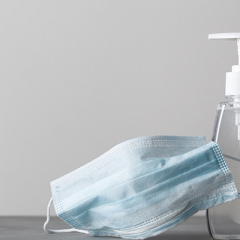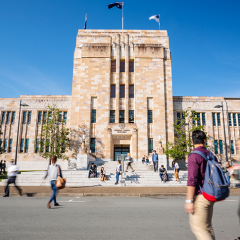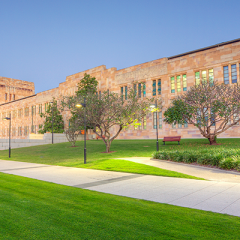Professor Claire Rickard is the new Professor of Infection Prevention and Vascular Access for UQ's School of Nursing, Midwifery and Social Work and the Herston Infectious Diseases Institute.
Professor Rickard is jointly funded with UQ and Metro North Hospital and Health Service. This role is particularly timely due to the global pandemic and the roll out of the COVID-19 vaccine.
What do you hope to bring to the role?
It’s the opportunity to improve the experience of patients encountering our health systems, not just locally but internationally. I'm based at UQ's Centre for Clinical Research which gives me daily interaction with outstanding UQ and Queensland Health researchers in related fields including infectious diseases, pharmacy, intensive and acute hospital nursing.
I also focus on mentoring clinical nurses to develop research skills. It’s a missed opportunity for the health system, when nurses don't get to take their good ideas to the next level, and there's a lot of barriers to nurses developing research careers. That said, if those of us who are leading the profession can help develop clear and sustainable pathways for clinical research careers, the next generation will achieve even more than we have.
What are your key research interests?
I'm passionate about preventing infections and other complications for people needing intravenous and other invasive devices for medical treatment. We know that in Australian hospitals, up to 10,000 patients develop a bloodstream infection caused by their healthcare, and some will die from this. One third of these infections are caused by bacteria entering the blood through intravenous catheters, and the next highest proportion from urinary catheters. That shouldn't happen.
If all your blood vessels were taken out and laid end to end, the line would stretch over 160,000 km; Australia's coastline is only about 35,000 km. That's why the bloodstream and the blood vessels are so useful in healthcare because we can very quickly and directly provide medication to any cell in your body just by getting access to your bloodstream, through some type of catheter. But we have to do it in such a way that is comfortable for you, and doesn't cause you any further complications.
Can you share some of your career highlights?
I've been so incredibly lucky to work with massively talented teams. In 2007 we established a clinical-academic network that grew to be the Alliance for Vascular Access Teaching and Research or AVATAR, which has been a successful vehicle for bringing like-minded people together and doing high-quality work. We have completed many large randomised controlled trials including the DRIP, SAVE, and RVSP trials published in the Lancet. Our work is cited in hospital and medical guidelines all around the world.
Apart from the science, I feel we have contributed to an important cultural change in healthcare, to really value the way we provide and think about vascular access, culminating in a new Australian government standard for intravenous devices published in 2021 by the Australian Commission for Safety and Quality in Healthcare.
What aspects do you enjoy most about your work?
I'm very curious and I like joining the dots. So many times in healthcare we have a little bit of data here and important clinical experience there, but we don’t link it. I like the challenge of putting all that together and to try and create tomorrow's healthcare, today.
My most happy day is when a former research student or staff member gets appointed to a great new job where I know that their research skills and training are going to help them to improve our health care system and our nursing profession. One person can only do so much in their career, but if we all did a little bit of research, we could revolutionise healthcare. I do miss looking after patients, but I hope I am helping to look after thousands of patients globally through the knowledge that we generate, and the outreach teaching that we do.
What inspired you to get into nursing and infection prevention?
I was hospitalised for many months after a car accident as a child and hospitals were like a secret world. The nurses seemed to know everything and were so much fun. It seemed like the best job in the world, and it was. The infection prevention interest came once I was a nurse, and the variation in many routine procedures intrigued me. Each hospital or even each ward in a hospital could be using a different dressing or antiseptic, and they were all sure theirs was the best way to protect patients. Of course, we usually had no actual data to know which way was best. So many research questions come out of these practical issues, and they have the potential to save lives by reducing hospital infections, and to let nurses make the best use of their time by identifying what is evidence-based and effective.
How relevant is your role and research area during this time with the global pandemic and roll out of the COVID 19 vaccine?
The pandemic has absolutely emphasised the key role of infection prevention specialists, typically nurses, both in the community and in hospitals. We are asking so much of them and their workload has been dramatically increased with the set-up and running of vaccination hubs, contact tracing requirements, development of guidelines for PPE and quarantine. It's now really important that we invest in and support infection prevention and vascular access nurses and other specialists, so they can sustainably manage this and future pandemics.



